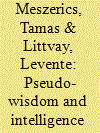|
|
|
Sort Order |
|
|
|
Items / Page
|
|
|
|
|
|
|
| Srl | Item |
| 1 |
ID:
098198


|
|
|
|
|
| Publication |
2010.
|
| Summary/Abstract |
Women's political action committees (PACs)-those committees founded by women to raise money for women candidates-have been and will likely continue to be an important part of American electoral politics. In this article, we investigate the impact of EMILY's List, because it is the standard bearer of women's PACs and is commonly cited as crucial to women's electoral success. Empirical studies of EMILY's List impact to date have largely assumed causal inference by using traditional linear models. We use a propensity score-matching model to leverage on causality and find that an EMILY endorsement helps some candidates and hurts others. Our findings set the stage for further and more nuanced investigations of when, where, and how EMILY's List can enhance the likelihood of electoral success for women.
|
|
|
|
|
|
|
|
|
|
|
|
|
|
|
|
| 2 |
ID:
134797


|
|
|
|
|
| Summary/Abstract |
Much ink has been spilled to describe the emergence and likely influence of the Tea Party on the American political landscape. Pundits and journalists declared that the emergence of the Tea Party movement pushed the Republican Party to a more extreme ideological position, which is generally anti-Washington. To test this hypothesis, we analyzed the ideological positions taken by candidates in the 2008 and 2012 pre-Iowa caucus Republican presidential-primary debates. To establish the positions, we used the debate transcripts and a text-analytic technique that placed the candidates on a single dimension. Findings show that, overall, the 2012 candidates moved closer to an anti-Washington ideology—associated with the Tea Party movement—and away from the more traditional social conservative Republican ideology, which was more salient in the 2008 debates. Both Mitt Romney and Ron Paul, the two candidates who ran in both elections, shifted significantly in the ideological direction associated with the Tea Party.
|
|
|
|
|
|
|
|
|
|
|
|
|
|
|
|
| 3 |
ID:
094081


|
|
|
|
|
| Publication |
2010.
|
| Summary/Abstract |
Almost all the strategic surprises that the major powers suffered in the last one hundred years are at least partly attributable to some form of intelligence failure. For the United States the new millennium started with two major failures of this sort: the terrorist attacks of 11 September 2001 and the absence of weapons of mass destruction in Iraq. Naturally, the ever-growing literature in Intelligence Studies treats this topic with special emphasis, at least on a par with other salient issues such as the consumer-producer interface and/or the perennial question of politicization. Despite the widespread attention, no single definition of intelligence failure commands a wide-enough consensus within the discipline or among practitioners. Though obviously related to strategic surprise, whether these should be lumped together with tactical-level shortcomings in intelligence is unclear. Failure can occur at different stages of the intelligence cycle, and distinguishing between these phenomena is probably desirable. However, in the major historical cases, telling apart the otherwise conceptually distinct tasking failure from collection failure, or both from analytic failure and dissemination failure, has proven to be rather difficult. Noting these complications, the focus hence is on analytic failures of a strategic nature.
|
|
|
|
|
|
|
|
|
|
|
|
|
|
|
|
|
|
|
|
|